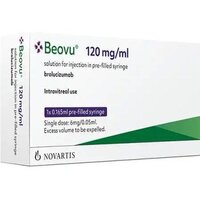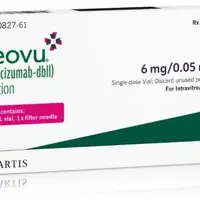Generic name: brolucizumab-dbll
Drug class: Anti-angiogenic ophthalmic agents
Dosage form: intravitreal injection
Availability: Prescription only
Pregnancy & Lactation: Risk data available
Brand names: Brolucizumab (monograph), Brolucizumab ophthalmic
What is Beovu?
Beovu (brolucizumab-dbll) injection is a biological drug that is used to treat two chronic eye conditions. One is called neovascular (wet) age-related macular degeneration (AMD) and it is a leading cause of vision loss in people 50 years of age and over. The other is called diabetic macular edema (DME). It is a complication of diabetes and another leading cause of vision loss. Beovu is given by injection into the eye.
Wet ADM occurs when abnormal, leaky blood vessels grow under your macula. The macula is the part of your retina at the back of your eye and it is responsible for your central vision. The leaky blood vessels can cause scaring on your macula, leading to blurry vision, wavy lines in your vision, muted colors and blind spots.
DME is caused by the leakage of fluid into the retina by damaged blood vessels. This can lead to localized swelling, including swelling of the macula.
Beovu is a type of drug called a humanized recombinant monoclonal antibody fragment. It targets and inhibits vascular endothelial growth factor-A (VEGF-A). VEGF-A is a protein that some people with these eye diseases produce too much of.
Beovu is a VEGF inhibitor that works by binding to and blocking VEGF-A from interacting with vascular endothelial growth factor receptor-1 (VEGFR-1) and -2 (VEGFR-2). This helps to stop the growth of new abnormal, leaky blood vessels in the eyes.
Beovu was approved by the US Food and Drug Administration (FDA) in 2019. No biosimilars of Beovu have been approved. Biosimilars are highly similar versions of a biological drug that are designed to have the same effect on a person, but a biosimilar is not identical to the original version of the drug.
What is Beovu used for?
Beovu is a prescription medication used for the treatment of neovascular (wet) AMD and DME.
Warnings
Beovu can cause serious side effects including:
- Infection of the eye or retinal detachment (separation of retina from the back of the eye).
- Inflammation of the retinal blood vessels (Retinal vasculitis) and/or blood clots in the retinal veins (retinal vascular occlusion), typically when there is inflammation in the eye.
- Increased eye pressure. Increased eye pressure has been seen within 30 minutes of an eye injection, including Beovu. Sustained increases in eye pressure also have been reported. Your doctor should monitor for this when you receive a Beovu injection.
- A potential risk of stroke, heart attack, or blood clots. These adverse events have been observed in patients receiving eye injections of VEGF inhibitor drugs, including Beovu.
- Sudden vision loss. Sudden vision loss due to blockage of the blood vessels in the back of the eye and inflammation of blood vessels in the back of the eye have been reported.
Tell your doctor straight away if you get any of these symptoms after Beovu is injected:
- redness of the eye or worsening eye redness
- eye pain
- increased eye discomfort
- sudden vision loss
- blurred or decrease vision
- an increased number of small particles in your vision
- increased sensitivity to light
These could be symptoms of a serious eye condition and may result in your doctor discontinuing your treatment with Beovu.
Tell your doctor straight away if you develop signs of a possible allergic reaction, such as a fast pulse, low blood pressure, sweating, rash, itching or stinging after Beovu is injected.
The safety and efficacy of using Beovu in both eyes at the same time has not been looked at. Using Beovu in both eyes at the same time may increase the risk of side effects.
How should I take Beovu
- Beovu will be injected by a trained healthcare professional.
- Beovu is given by intravitreal injection - an injection into your eye.
- Before the injection is given a healthcare professional will:
- Clean your eye with a disinfectant wash to prevent infection.
- Administer a local anesthetic eye drop to numb your eye.
- For neovascular (wet) AMD
- Beovu is injected once per month for the first three months.
- After the first 3 months, Beovu may be injected once every 2 to 3 months (8 to 12 weeks). Your doctor will determine the right treatment schedule for you based on the condition of your eye.
- For DME
- Beovu is injected once ever six weeks for the first five doses
- After the first 5 doese, Beovu is injected once every 2 to 3 months (8 to 12 weeks).
- Always follow the treatment schedule recommended by your doctor.
- Talk to your doctor before stopping
Dosing information
- For neovascular (wet) AMD
The recommended dose of Beovu is 6 mg (0.05 ml of 120 mg/ml solution) monthly (approximately every 25 to 31 days) for the first 3 doses, followed by one dose of Beovu 6 mg (0.05 ml) every 8 to 12 weeks. - For DME
The recommended dose for Beovu is 6 mg (0.05 mL of 120 mg/mL solution) administered by intravitreal injection every six weeks (approximately every 39-45 days) for the first five doses, followed by 6 mg (0.05 mL) by intravitreal injection once every 8-12 weeks.
See full prescribing information for further details about Beovu dosing.
Before Taking
Do not use Beovu if:
- you are allergic to brolucizumab or any of the ingredients in Beovu. See below for a complete list of ingredients in Beovu
- you have an infection in or around your eyes
- experience pain or redness in your eyes
What should I tell my doctor before receiving Beovu?
Before receiving Beovu, tell your healthcare provider about all of your medical conditions, including if you:
- Have an infection in or around your eye
- Have active inflammation inside your eye - intraocular inflammation (uveitis)
- Have glaucoma
- Have a history of seeing flashes of light or floaters (dark floating spots) and if you have a sudden increase of size and number of floaters
- Had surgery performed on your eye within the previous four weeks
- Have a surgery planned on your eye within the next four weeks
- Have a prior history of eye conditions or eye treatments
What happens if I miss a dose?
If you miss a dose of Beovu call your doctor as soon as possible. Your doctor will tell you when your next dose should be given. It's important to follow the treatment schedule they recommend to get the full benefit of Beovu. Missing an injection may reverse the visual improvement you may have experienced.
What should I avoid while using Beovu?
Beovu injection may cause temporary vision problems, such as blurry vision. Do not drive or use machines for as long as Beovu affects your vision.
Beovu side effects
Beovu can cause serious side effects including:
- See "Important information" above
The most common side effects of Beovu are:
- reduced clarity in vision
- cataracts
- broken blood vessels in the eye
- eye pain
- vitreous floaters (moving spots in the field of vision).
These are not all the side effects of Beovu. Call your doctor for medical advice about side effects. You may report side effects to the FDA at 1-800-FDA-1088 or visit www.fda.gov/medwatch.
See more: Beovu Side Effects




